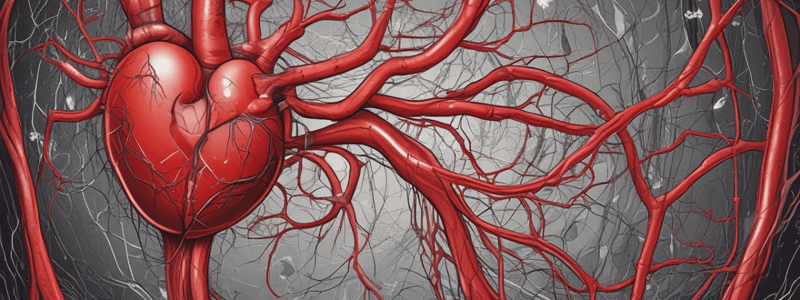Podcast
Questions and Answers
What type of capillary has a permeability somewhere between that of continuous and sinusoidal capillaries?
What type of capillary has a permeability somewhere between that of continuous and sinusoidal capillaries?
- Sinusoidal capillary
- Fenestrated capillary (correct)
- Capillary with a permeability identical to that of sinusoidal capillaries
- Continuous capillary
Which of the following types of capillaries has a basal lamina that is discontinuous?
Which of the following types of capillaries has a basal lamina that is discontinuous?
- Continuous capillary
- Fenestrated capillary
- Sinusoidal capillary (correct)
- All of the above
What is a characteristic of arterioles?
What is a characteristic of arterioles?
- Media has only one layer of smooth muscle cells
- Prominent internal and external elastic lamina
- Relatively thin wall and large lumen (correct)
- Thick media composed of sheets of elastic fibers
Which type of artery has a thick media composed of sheets of elastic fibers?
Which type of artery has a thick media composed of sheets of elastic fibers?
What is a characteristic of venules and veins?
What is a characteristic of venules and veins?
Which type of capillary is found in the liver, bone marrow, and spleen?
Which type of capillary is found in the liver, bone marrow, and spleen?
What is a characteristic of medium-sized veins?
What is a characteristic of medium-sized veins?
Which type of artery has a prominent internal and external elastic lamina?
Which type of artery has a prominent internal and external elastic lamina?
What is the primary function of the cardiovascular system?
What is the primary function of the cardiovascular system?
Which sequence correctly describes the flow of blood through the cardiovascular system?
Which sequence correctly describes the flow of blood through the cardiovascular system?
What are the three layers of blood vessels known as?
What are the three layers of blood vessels known as?
Which type of capillary is the least permeable?
Which type of capillary is the least permeable?
What characterizes fenestrated capillaries?
What characterizes fenestrated capillaries?
What structures are generally found in the media layer of blood vessels?
What structures are generally found in the media layer of blood vessels?
Where would you expect to find sinusoidal capillaries?
Where would you expect to find sinusoidal capillaries?
What is the primary role of the intima layer in blood vessels?
What is the primary role of the intima layer in blood vessels?
Flashcards are hidden until you start studying
Study Notes
Cardiovascular System
- The cardiovascular system transports and exchanges nutrients, oxygen, body fluids, waste material, heat, and blood cells around the body.
Blood Vessels
- Basic structure: closed system of plumbing with blood circulating through pipes (blood vessels) and propelled by an in-line pump (the heart)
- Blood flows through the system in the following order: heart → elastic artery → muscular artery → arteriole → capillaries → venules → vein → heart
The Three Layers (Tunics) of Blood Vessels
- Intima: endothelium and subendothelium
- Media: varying compositions in different vessels
- Externa: vasa vasorum and other components
Capillaries
- Smallest diameter of all blood vessels (7-9 μm)
- Function: allow exchange of metabolites and waste between blood and surrounding tissue
- Composed of a single layer of endothelial cells resting on a basal lamina
- Three types:
- Continuous capillaries (least permeable): found in muscle, connective tissue, glands, and nerve tissue
- Fenestrated capillaries: found in places where substances need to move quickly between tissues and blood (e.g. kidney, intestine, and endocrine organs)
- Sinusoidal capillaries (most permeable): found in liver, bone marrow, and spleen
Venules and Arterioles
- Relatively thin wall and big lumen in venules
- Relatively thick wall and small lumen in arterioles
- Media composition differs between venules and arterioles
Arteries
- Muscular arteries: thick media composed of smooth muscle cells, prominent internal and external elastic lamina
- Elastic arteries: thick media composed of sheets of elastic fibers, interspersed with layers of smooth muscle cells
- Examples: aorta and its large branches are elastic arteries, while "named" arteries (e.g. femoral artery) are usually muscular arteries
Veins
- Medium-sized vein: thin intima, may have valves, thin media composed of a few elastic fibers and smooth muscle cells, relatively thick externa
- Large vein: thin intima, may have valves, thin media like medium-sized veins, relatively thick externa composed of longitudinal collagen fibers, elastic fibers, and smooth muscle cells
- Examples: "named" veins (e.g. portal vein) are usually large veins
Studying That Suits You
Use AI to generate personalized quizzes and flashcards to suit your learning preferences.




